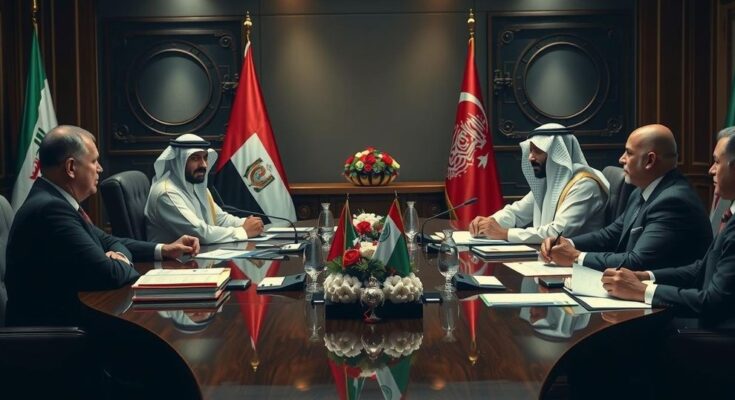The BRICS leaders affirmed their support for Palestine’s accession to the UN and a two-state solution during the recent summit, praising efforts for a ceasefire in Gaza and condemning violence against UN personnel. They highlighted the urgent need for humanitarian assistance and the release of hostages.
On October 23, 2024, during a summit, the BRICS leaders expressed their support for the admission of the State of Palestine as a full member of the United Nations, emphasizing their commitment to a two-state solution grounded in international law. They endorsed the efforts of Egypt, Qatar, and other regional stakeholders to achieve a ceasefire, facilitate humanitarian aid, and ensure the withdrawal of Israeli forces from the Gaza Strip. The summit’s statement, known as the Kazan Declaration, outlined the necessity for recognizing a sovereign and viable State of Palestine along the internationally recognized June 1967 borders, with East Jerusalem designated as its capital, coexisting peacefully with Israel. Furthermore, the BRICS leaders condemned attacks on United Nations personnel and called for an immediate halt to such actions, expressing deep concern over the humanitarian crisis exacerbated by the Israeli military operations in the occupied territories, which have led to significant civilian casualties, displacement, and destruction of infrastructure. They made an urgent plea for an unconditional and comprehensive ceasefire in Gaza and for the release of all hostages detained on both sides. Additionally, the BRICS leaders focused on the critical need to protect humanitarian operations and called for the implementation of multiple UN Security Council resolutions aimed at easing the crisis. They reiterated the importance of pursuing the establishment of a nuclear-weapon-free zone in the Middle East and other disarmament initiatives, underlining their commitment to peace and security in the region.
The BRICS, comprising Brazil, Russia, India, China, and South Africa, have increasingly positioned themselves as a counterweight to Western influence in international relations. Their discussions often reflect concerns over global security issues, economic cooperation, and humanitarian crises. The Israeli-Palestinian conflict remains a focal point in international diplomacy, with calls for a two-state solution being a long-standing goal of many nations. The recent escalation in violence has provoked widespread international concern, resulting in renewed discussions on the need for a ceasefire and humanitarian assistance to affected populations, particularly in the Gaza Strip.
In summary, the BRICS leaders articulated their support for Palestine’s full membership in the United Nations and reaffirmed their commitment to a two-state solution as laid out by international law. Their strong condemnation of ongoing violence, humanitarian crises, and attacks on UN personnel underscores the urgent need for a comprehensive ceasefire and protection of humanitarian efforts. The call for further disarmament measures highlights a broader commitment to regional stability and security.
Original Source: www.egypttoday.com




